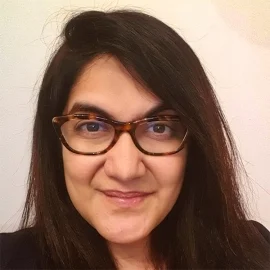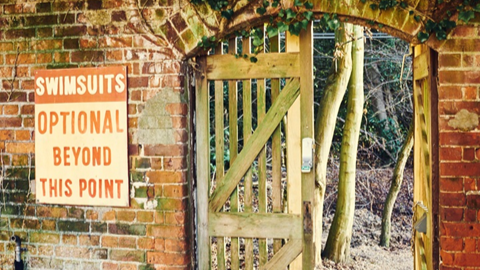Give it a try and see how it goes.
Speaking with the benefit of hindsight, four PhD Alumni career speakers shared fascinating stories of entering and moving on in the early stages of their careers in and outside academia. Their experiences might help you to think about your own progression.
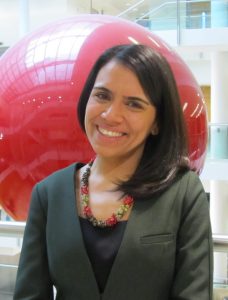 Dr Nayat Horozoglu is Assistant Professorial Lecturer in the Department of Management at LSE. Nayat completed her PhD in 2012 in the Department of Management. Before returning to LSE in 2019, she worked for more than seven years as a consultant advising trustee and corporate clients on pensions and investment issues. Nayat described transitioning from the PhD into the corporate sector and, from there, back into academia. She explains the enjoyment of working in a large consultancy, which came quite quickly after settling into her first role. The initial shock of working alongside master’s and undergraduate students passed and Nayat advises not dwelling on this. In a short period of time, her new employer realised that she was proactive, able, and competent. She built on her four years of PhD experience of going to conferences, teaching undergraduates, demonstrating skills and confidence in the new setting. Even at interview, she was able to explain the case problem clearly using skills practised as a GTA. The development experiences of the PhD process help in work settings. We discussed starting salary and the need to be realistic in the first position. This may be needed if you do not have relevant experience to use for making a case for an increase, especially for a graduate position. However, negotiating your salary is certainly something you should do for any subsequent roles.
Dr Nayat Horozoglu is Assistant Professorial Lecturer in the Department of Management at LSE. Nayat completed her PhD in 2012 in the Department of Management. Before returning to LSE in 2019, she worked for more than seven years as a consultant advising trustee and corporate clients on pensions and investment issues. Nayat described transitioning from the PhD into the corporate sector and, from there, back into academia. She explains the enjoyment of working in a large consultancy, which came quite quickly after settling into her first role. The initial shock of working alongside master’s and undergraduate students passed and Nayat advises not dwelling on this. In a short period of time, her new employer realised that she was proactive, able, and competent. She built on her four years of PhD experience of going to conferences, teaching undergraduates, demonstrating skills and confidence in the new setting. Even at interview, she was able to explain the case problem clearly using skills practised as a GTA. The development experiences of the PhD process help in work settings. We discussed starting salary and the need to be realistic in the first position. This may be needed if you do not have relevant experience to use for making a case for an increase, especially for a graduate position. However, negotiating your salary is certainly something you should do for any subsequent roles.
Take care of your career, no one will do it for you.
Doors open but when you are inside you must deliver and engage. After a few years, moving to a smaller company, Nayat found herself working with two other PhD qualified staff, which was comforting, and the environment felt fitting. Research work, writing advice and developing the ESG work used her skills and leading training sessions provided extra interest. Her career was going well, she enjoyed her work and was taking on high-profile roles within her company. However, her passion for mentoring junior associates, training clients and colleagues reminded her of her days in academia and how much she enjoyed herself there. From here, Nayat built the bridge back to academia applying for jobs in universities, some temporary jobs were offered but a permanent role was important. The HE Education Career Track has a focus on teaching and mentoring students, and the experience gained in the professional sector was valued in her selection interview LSE. She is now able to use her private sector knowledge in her current role in the Department of Management.
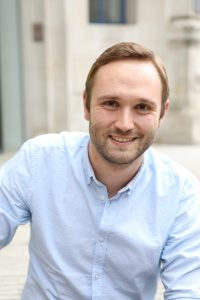 Dr Max Gallien is IDS Research Fellow at the University of Sussex. He is employed by the Institute of Development Studies (IDS) which is separate to, rather than a subset, of the University. Max completed his PhD in International Development at LSE in 2020, specialising in the politics of informal and illegal economies, the political economy of development and the modern politics of the Middle East and North Africa. He has taught at LSE and at King’s College and has advised government departments and embassies in both the UK and North Africa. Max spoke about finishing and moving on from his PhD, applying for jobs and coping with selection processes, as well as building an academic career.
Dr Max Gallien is IDS Research Fellow at the University of Sussex. He is employed by the Institute of Development Studies (IDS) which is separate to, rather than a subset, of the University. Max completed his PhD in International Development at LSE in 2020, specialising in the politics of informal and illegal economies, the political economy of development and the modern politics of the Middle East and North Africa. He has taught at LSE and at King’s College and has advised government departments and embassies in both the UK and North Africa. Max spoke about finishing and moving on from his PhD, applying for jobs and coping with selection processes, as well as building an academic career.
Side gigs are more important than I realised – media articles, blog posts, podcasts together built a portfolio of public engagement that I was not really conscious of, until I needed it in the recruitment process.
Having people around him who supported him through the process of finishing his PhD and applying for jobs has also helped Max. He acknowledged the ‘randomness’ and unpredictability of career opportunities in HE. There is greater diversity of academic careers than he imagined and being open minded and broad in scope has helped him get started. The only regret, ‘I wish I had started earlier’, as some vacancies has closed by the time he had started looking. Max appreciates his very diverse skillset, which plays its part in doing his job well and go far beyond the publication research record, which tend to be the main focus. Task approach skills such as getting back to people quickly, being confident to contact people, talking about yourself as an academic, all help in his field.
The mental transition from PhD to job takes time, the identity shift is gradual. Max describes living with the sense that you’re never done, there’s always more work to do and it can be toxic. He advises building relationships with others so you don’t internalise the nature of the job market and see this as the your measure of success.
Think ahead about other projects too, people want to know about the next thing, beyond your PhD.
Having a sense of what your field is and what you want to engage with is valuable as an academic. Knowing the people in your field and what they are doing helps you understand the landscape, even if you are not a highly active networker. Start thinking about moving on, diversifying your projects and have different ideas. Working with co-authors and colleagues can help with friendly support, especially when negative feedback comes. Work life balance has to be managed, no one tells you that you are good enough / have done enough and to stop working. On the other hand, Max likes making his own time plan. Time will tell if you can be happy and successful in the academic field. For Max, this first position is great, he says, ‘I am really enjoying it so far, particularly having multiple projects on the go and having interesting teaching too’.
Dr Anila Channa is Head of Monitoring, Evaluation and Learning at Integrity UK in London. Her PhD is in Development Studies from LSE in 2015. Anila combines experience from commercial organisations, academia, and international development. As a mixed methods specialist and seasoned team leader, she has experience in research and analytics, and team and project management. Anila has particular interest in education and gender, and in the use of rigorous, innovative research and evaluation methods. Anila spoke about moving on from her PhD and building her career in specialist development consulting. During her PhD she planned ahead for a move into development work and focussed on networking, building professional relationships in the fields where she wanted to work, gaining consultancy experience and policy publications. Her PhD was based on four papers, not a monograph and she supervised data collection as part of her primary research, all positioning her for a role in professional practice afterwards. She nurtured contacts and sustained relationships effectively so that freelance work was available to her after the end of the PhD.
Three transferable qualities from her PhD have helped Anila in her professional life: being able to write in accessible styles for different audiences; meeting deadlines; and being pragmatic about research and evaluation (it’s never going to be as rigorous as your PhD again). She describes the resilience gained and proved through the PhD process at LSE as a firm foundation for the next step. She is encouraging, ‘you’ll make it through’.
Was your PhD worth it?‘Hell yeah!’
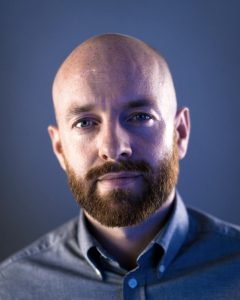 Dr Anthony Kelly is Digital Anthropologist at L’Atelier BNP Paribas, Paris. Anthony completed his PhD in 2020 at LSE in Media and Communications. He talked about finishing his PhD and moving into work in research in the corporate sector at Director level as a Digital Anthropologist. He was introduced to the organisation though a previous academic connection. Describing the lengthy selection process (interviews, work simulations, creative projects), and the work he now does, Anthony enabled us to consider the connections and conflicts between PhD study and work. The research he does now is different from his PhD work. He is responsible for creating his stream’s research pipeline, hiring people, directing and reporting on projects, managing external contractors and working with designers to communicate research. It brings him into contact with new clients and develops new skills in research management, client relationships and leadership. The value of the PhD in all this:
Dr Anthony Kelly is Digital Anthropologist at L’Atelier BNP Paribas, Paris. Anthony completed his PhD in 2020 at LSE in Media and Communications. He talked about finishing his PhD and moving into work in research in the corporate sector at Director level as a Digital Anthropologist. He was introduced to the organisation though a previous academic connection. Describing the lengthy selection process (interviews, work simulations, creative projects), and the work he now does, Anthony enabled us to consider the connections and conflicts between PhD study and work. The research he does now is different from his PhD work. He is responsible for creating his stream’s research pipeline, hiring people, directing and reporting on projects, managing external contractors and working with designers to communicate research. It brings him into contact with new clients and develops new skills in research management, client relationships and leadership. The value of the PhD in all this:
Rigour, innovation, creativity and clear sightedness, honed through the PhD process help me navigate this phase of my career
Anthony is building his professional profile, joining and contributing to Professional Bodies and industry networks, such as EPIC (Ethnography Praxis in Industry Conference) and the European Association of Social Anthropologists (EASA). He is an advocate for research dissemination and knowledge exchange, particularly as a means of establishing one’s professional voice. The LSE KEI Guide is a good place to seek information. Endurance and assertiveness are key qualities in Anthony’s toolkit now, combined with the research rigour and high quality expectations developed though his PhD at LSE.
All our speakers emphasised the skills and qualities they gained and honed during their time at LSE, some examples:
- communicating and explaining complex ideas to a non-specialist audience
- dealing with people diplomatically and with awareness of hierarchies
- being able to express views, speak confidently, teaching, conferences, presentations and other activities to build skills in different ways
- adapting language to the environment you are in and learning to use some of the vocabulary of the field helps you to fit in
- research literacy, being able to read quickly, knowing methods, understanding how a paper works, being able to engage with academic literature
- working with colleagues in groups as well as independently, building relationships and gaining colleagues
- working hard with focus and intrinsic motivation
- managing yourself, managing your time, managing multiple mini projects and deadlines.
All speakers shared a sense of optimism, there are opportunities in and outside academia and we are encouraged to be positive and purposeful in career planning. Finally, if you can, don’t be hard on yourself. Things do come together and the first step after the PhD is often the hardest. LSE Careers is here to help both now and for five years after you complete.
Book a one-to-one appointment with Catherine Reynolds to review, build and plan for your future. Explore our careers events for PhDs and Research staff. Let us know what else you need to support your career and future plans.


